- Home
- Lou Cameron
Stringer in Tombstone Page 6
Stringer in Tombstone Read online
Page 6
Stringer said, “That would have been just about the time the first reports of color up Alaska way were coming in. I reckon I’d have quit a failing silver mine and joined a gold rush if I didn’t know better. I see at least two shady characters of the Alaska rush have wandered back. I’ll be back around three, anyway. I just can’t wait until this town comes back to life again.”
He went back outside. It was even hotter now. He knew that if he went back to his hotel for a siesta he’d have a hell of a time falling asleep and if he did he’d wake up cranky and out of sorts. He needed a shave, and a haircut wouldn’t kill him. Doing anything had wandering around in the Arizona sun beat by miles.
The sun had crawled across the cloudless sky enough to offer at least a shady patch yonder and about. Stringer found a corner barber shop that wasn’t being baked too badly and went in to find that other great minds had run in the same channels. There were a couple of gents ahead of him.
Like the bald barber and just about everyone else he’d seen so far in Tombstone, they were much older than he was. He saw that they, as well as the old gent in the one barber’s chair, had hung their gun rigs along with their hats on hooks along the plastered ‘dobe wall. He hung up his Roughrider hat but wasn’t ready to get that far from his side arm just yet. As he sat down on a bentwood chair, adjusting his holster so it hung less awkwardly over the edge of his hard seat, he kept his peace and rolled a smoke. The old-timers took only a few minutes to get used to his presence and, just as birds are inclined to resume chirping once they see a housecat on a back porch is just sitting there, they commenced to go on living in the past or on hopes for the future.
Stringer didn’t join in. He’d been around enough to know that regulars tended to include a newcomer when they damn well felt like it and resented a pushy stranger. He doubted any of them could tell him anything he really wanted to know about Tombstone to begin with. But as he sat there, silently smoking, he learned more than he really wanted to know, anyway. He didn’t grasp some of the laconic gossip about people he didn’t know; but he could follow the drift well enough to learn, or confirm, that Tombstone was barely hanging on because of economic factors none of the old gents might have understood, had he been dumb enough to lecture them.
Thanks to that one Stanford course they’d made him take whether he wanted to or not, Stringer knew that while towns had to be created by mankind, once they’d grown to a certain size, they sort of took on a life of their own, like a fungus or a cancer.
Tombstone had been spawned by death, when two unknown prospectors had been jumped by Apache in the foothills of the Dragoons. After the Apache and the buzzards had finished with them, their bones had just sun-bleached there for an unknown number of years. Eventually Indian scout Ed Schieffelin, prospecting on his own in an area he’d been warned would be the death of him, spotted something white in the chaparral, had a closer look, and found not only the skeletons lying head to head, but a pile of silver ore the Apache had no doubt dismissed as worthless rocks the white eyes had meant to make medicine with.
It didn’t take an old scout like Schieffelin long to backtrack the original discoveries to their nearby and already opened silver vein. With the backing of a more prosperous brother, the sardonic Schieffelin recorded his strike as the Tombstone mine. By the spring of ‘79 the Schieffelin brothers had struck the even richer Lucky Cuss and Tough Nut veins, and then, having planted the spore of a town where only Apache had roamed before, the now-wealthy brothers sold out and played no further part in the mushroom growth of the mining camp down the slopes.
They didn’t have to. Given any reason for being there, a town just grows. Drawn by dreams of easy money, folk flocked in from all directions; via Texas Canyon, Dragoon Gap, and Mustang Pass they came. They poured over the Mogollon Rim, covered wagons and all, or along the Apache-haunted Camino del Diablo. Many who chose that route never made it. By the end of the year the town was a worthy rival of Tucson and demanding its right to serve as the county seat. The territorial governor, appointed by the Republican Hayes administration, solved that problem in a manner worthy of Solomon. He simply cut the original Pima County in two and let both towns serve as county seat. Both Pima and the newer Cochise County would reward the Republicans by ever after voting almost solid Democrat.
Thus it came to pass that by the turn of the century, with little or no help from the ruffians who’d be remembered longer than its mines, Tombstone was still there. It lived on, however modestly. Stringer knew it could never again be the boom town the old-timers were mooning about, but should they manage not to blow it up or burn it down, Tombstone was there to stay, if only as a market town and entertainment center for the surrounding cattle outfits. He thought their notion of making the Bird Cage Opera House the biggest and wildest whorehouse in the territory sounded like a pipe dream. He was too polite to say so, and after a time it was his turn in the chair.
By the time the old barber was draping the seersucker sheet over Stringer some other customers had come in to occupy the vacant seats and wall hooks. One younger rider, dressed more cow, hung up an S&W .38 that could have come from the same litter as Stringer’s. He said he’d just ridden in and that the range was so dry he’d been afraid to smoke on the trail. Stringer knew one of the others would ask him how the stock was doing and that he’d say poorly. Nobody ever admitted to owning fat cows this close to the border.
The old barber asked Stringer the usual polite questions as he lathered and shaved him, but then he plopped a hot towel over Stringer’s face without waiting for an answer. Stringer usually shaved himself and, in any case, it was just too damned hot to enjoy the scalding. So he sat up straight and removed the hot towel himself, muttering, “That felt swell. Now, if you’d just trim the sides…” Then he noticed Knuckles Ashton had come in for his own barbering while he’d been under the towel. Knuckles looked equally surprised as they locked eyes. Nodding pleasantly, Stringer said, “Howdy. I sure hope we’ve got things settled between us, Knuckles.”
Knuckles got to his feet, ready to say he’d come back later, most likely. Then he spotted the otherwise innocent S&W hanging on the wall a lot closer to him than to Stringer, and slid between the barber chair and gun, grinning like a coyote who’d just spied a newborn lamb with nary a sheepherder in sight. His sinister move wasn’t lost on the old barber, who’d no doubt been barbering in Tombstone some time. He stopped Stringer’s haircut before he’d started it with a snip of his scissors and the warning, “Hold on, Ashton. If you boys have something to settle, I sure wish you’d take it outside.”
Knuckles growled, “Shut up and stand clear unless you want the same, old man. That goes for everyone else in here. I got a lot to settle with this old boy. Ain’t that true, MacKail?”
Stringer said, soberly, “Far be it from me to call a man who seems to have the drop on me a liar. But we’d better study on this situation, Knuckles. I hope you and all these other gents can see I came in here for a shave and a haircut, ahead of you.”
Knuckles just went on looking mean and dumb, so Stringer elaborated, “This is a barber shop, not the O.K. Corral, and even then the winners got run out of town in the end.”
Knuckles grinned slyly. “That’s all right. I was fixing to leave town by sundown in any case. But first I aim to settle the score with you.”
By this time the barber had moved over to a far corner and the two remaining customers were cowering in another. The braggart who had the floor shot a last quick look at that hung-up S&W before he muttered, “If you got any last words, you’d best say ‘em now, MacKail.”
Stringer said, “Knuckles, you’re sure making an awesome mistake. Why don’t we drop this kid stuff before someone gets hurt?”
Knuckles took a deep breath, said, “I’ll just show you who’s a kid around here!” and went for his .45, left-handed.
Naturally, Stringer had been holding his .38 in his right hand for some time. So as he fired, thrice, double-action, the burly southpaw spun on o
ne bootheel and dove headfirst through the plate-glass front of the barber shop to wind up on the walk outside, covered and cut up by shattered glass and squealing like a stuck pig.
Stringer whipped off the seersucker sheet and rolled out of the chair, smoking six-gun in hand, to leap through the now-glass-free storefront and land almost atop his victim. He failed to see how a dead man could be making so much noise, so he hunkered down to disarm Knuckles before he soothed, “Aw, shut up, you can’t be hurt that bad.”
Knuckles pounded on the walk with one bloody fist, sobbing, “Now you’ve done it! You’ve kilt me and my poor old mother will never get to see her baby again.”
The barber stuck his head out, warily, to ask how bad it might be. Stringer said, “I’m sorry about your powder-burned seersucker and busted window. I’ll be proud to pay for both, even if the window wasn’t entirely my fault.”
The barber said, “I was talking about Knuckles, there.”
Stringer began to reload as he replied, “Oh, he’s just hit in his shoulder, hip, and ass. It’s hard as hell to aim offhand with drapery all over your muzzle.”
By this time, despite the ovenlike afternoon heat, others were moving in from all sides. When Stringer spotted Skagway Sam in the crowd he lowered his .38 to his side but didn’t holster it. But it was an older and skinnier gent with a brass star pinned to the lapel of his undertaker-looking outfit who first demanded an explanation of the recent noise and the moaning results at Stringer’s feet.
The old barber called back, “For God’s sake don’t draw on this gent, Wes! Even if you could take him, he was in the right. I was just now trying to give him a haircut when Ashton, there, told one and all he intended to kill him, premeditated, with results you can see with your own eyes.”
The town law joined Stringer above the bleeding and braying Knuckles to observe, mildly, “I’ve been expecting this one to wind up dead, or hung as the winner. I don’t believe I know you at all, old son.”
Stringer holstered his six-gun and hauled out his credentials. As the lawman called Wes scanned them, Skagway Sam came over to stare soberly down at the mess at their feet. He said, “Some boys just never learn. I’d just fired Knuckles as a gutless troublemaker, Marshal. But for old time’s sake, I’ll get a doc on my payroll to patch him up.”
Wes said, dryly, “He could use some patching. Are we talking about that old abortionist who looks after the whores you and Faro Fran have working at the Oriental, now?”
Skagway Sam smiled good-naturedly. “Somebody has to. By the way, I’m a gambler, not a pimp. My, ah, companion, Faro Fran, runs that concession. I doubt old Knuckles here needs to be treated for the clap or an unwanted offspring. But the doc treated gunshot wounds in the War Between the States and, hell, it won’t cost the town nothing, whether he dies or not.”
Wes said that sounded fair, but shot a thoughtful look at Stringer as he handed back the billfold, saying, “Skagway may not care if this gent you just shot makes it or not. But we do have some rules, here in Tombstone. I hope you wasn’t planning on leaving town in the near future, Mr. MacKail.”
Stringer cursed under his breath before he replied, “As a matter of fact I was planning on riding back to the rail line this evening, with permission of my boss, as soon as I got it. I take it you and the county coroner are willing to suspend judgment, one way or the other, until this silly bastard figures out whether to live or die on us?”
“That’s about the size of it,” Wes agreed. “The coroner as well as the county sheriff are down in Bisbee right now. They let us run things, up this way, unless they get really serious. I can’t see Knuckles pressing assault charges against you and I take it you don’t want me to arrest him for assaulting you, just now?”
Stringer shook his head vigorously. “Hell, no,” he yelped. “I can’t wait to be on my way as it is. How long do you figure I’ll be stuck here, Marshal?”
The older man said, “It’s up to old Knuckles, here. If he dies, you could be stuck here quite a spell.”
CHAPTER FIVE
Things got worse when Stringer stopped by the Western Union office just after three to find a reply from his feature editor waiting for him. The cranky old bastard said he was backtracking that wire-service false alarm about the great flood and that, meanwhile, Stringer should stay put, in case there was someone the Sun wanted beat up. Barca suggested that as long as he was on the scene, a rehash of the famous feud between the Earp and Clanton factions might be worth running in the Sunday supplement if Stringer could come up with a fresh angle or, better yet, some hitherto unpublished photographs.
Stringer balled the wire up with a growl of dismissal. But as he cooled off with a cold Coca-Cola on the shady porch of the grocery across the way, he couldn’t help adding up the space rates of a two-or three-page Sunday feature. At least something or other had once happened somewhere around the O.K. Corral. That was more than the man-eating giant artichoke of Madagascar could say, and Jack London was cleaning up with his man-eating wolves along the Yukon. So in hopes of hitting two birds with one more walk in the hot sun, Stringer headed for the library near the old county courthouse.
The library was still open after all and, better yet, the gal on duty was some pumpkin, if you didn’t mind horn-rim specs. He figured her for about twenty-five, built right to pose for old Charles Dana Gibson, but not with all that auburn hair. She had it pinned atop her head in the current style, but Stringer suspected it fell way past her behind when she let it down. He warned himself not to picture a gal who was already good-looking enough standing bare-ass with her hair down. He ticked his hat brim to her and began by asking if another librarian answering to Tillie Gower had ever shown up.
She stared back through her specs, puzzled, and allowed she’d never heard the name, that she was the only librarian they still had, and that while her name was Iona Fraser she preferred to be called Annie. He nodded, knowingly, and said, “I was saddled with a West Highland handle, too. Comair e tha thu?”
She replied, “Tha mi gu math, and if it’s all the same to you I’m trying to live it down, Mr. ah…?”
“Stuart MacKail, but call me Stringer,” he replied.
Annie dimpled and said, “I don’t blame you. If your people were like mine you were raised on the same tales of blood and slaughter.”
“To tell the truth,” he said, laughing, “I came here this afternoon to look up more recent feuding and fussing. I write for the San Francisco Sun and they want a rehash of the Earp and Clanton feud here in Tombstone.”
She made a wry face—her nose was pretty, even wrinkled up—and said, “Oh, Lord, let’s talk about the MacDonalds and the Macleods, in the Old Country. At least they had reasons to kill one another. I’ve been hearing about those silly Earps and Clantons since I was a child and they still don’t make any sense.”
He counted backwards, mentally, and said, “Far be it from me to ask a lady’s age, Miss Annie, but is it safe to assume you could have been here, sort of young, on that fatal day in the October of 1881?”
She bobbed her head as she replied, “I was in the first grade, as a matter of fact. My late father was a foreman at the Lucky Cuss and my Uncle Murdoch was timekeeper at the Tough Nut.”
He said, “Anyone can see you come from quality, Miss Annie. But what did you and your little classmates think when you heard about that fight that’s become so famous?”
“Nothing,” she stated simply. “We never heard about it until we were older. Our parents didn’t talk about it at the time. You see, those drunken drifters over on Allen Street were always killing one another. It wasn’t a subject of interest to the more civilized residents of Tombstone.”
“That sounds reasonable,” Stringer agreed. “Back in Frisco the folk on Nob Hill take little interest in the tong wars of our Chinatown. But, dumb as it sounds, my feature editor wants me to pretend it was more serious. So what would you have here on the topic of Tombstone toughs in the good old days?”
She gaspe
d, “Good heavens, this is a library, not a penny-dreadful shop. I think we do have some works by Colonel William Cody and we have an autographed copy of Ben-Hur, written by the former governor of New Mexico, Lew Wallace. But books about the likes of Johnny Ringo, Buckskin Frank, that awful Dr. Holliday, and those disgusting Earp brothers? Why on earth would anybody write a book about such no-account residents of this otherwise upright town?”
“Wyatt Earp’s wife has,” Stringer said, sighing. “I don’t know if she’s found a publisher, yet. I suspect it’s as biased as the back issues of the Tombstone Nugget I’ve read, slanted the other way entire.”
She nodded. “Both the Nugget and Epitaph have always been ferociously partisan. You might try back issues of either the Tombstone Expositor or Evening Gossip. They never carried as much about the low-life along Allen Street, but when they did they tried to stick to just the facts.”
He said, “That’s a grand notion, Miss Annie. Where might either of these more reliable newspapers be published, here in town?”
She started to give directions. Then she flustered and said, “Oh, silly me. Since the mines shut down I fear the only paper still in business is the Epitaph. But I’m sure they’d let you look through their…old files?”
He said, “We call it the morgue in the newspaper game. I fear I don’t need the Epitaph to assure me the Earps could do wonders, and do no wrong. I’ve known for some time that old John Clum, the owner of the Epitaph, was a drinking pal of Wyatt Earp.”
She shook her head and said, “You mean Virgil and Morgan Earp, the older brothers. Young Wyatt was just a sort of tag-along in his Tombstone days. They had some other brothers, I believe. But Virgil and Morgan were the real toughs of the clan.”

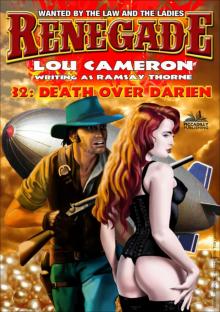 Renegade 32
Renegade 32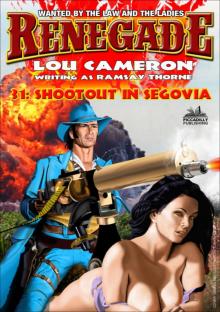 Renegade 31
Renegade 31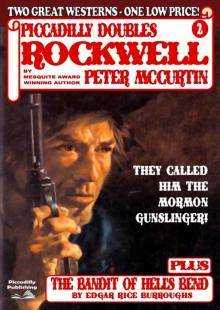 Piccadilly Doubles 2
Piccadilly Doubles 2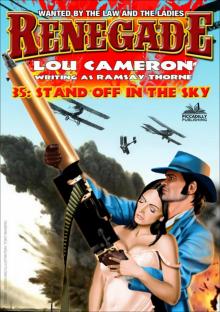 Renegade 35
Renegade 35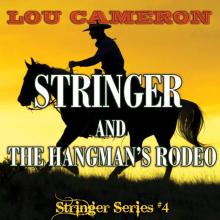 Stringer and the Hangman's Rodeo
Stringer and the Hangman's Rodeo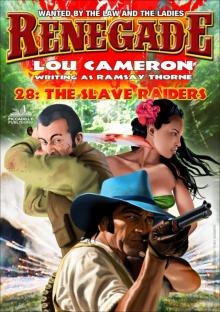 Renegade 28
Renegade 28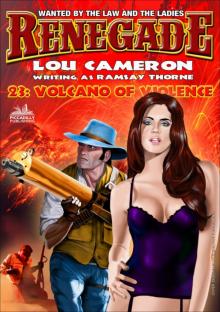 Renegade 23
Renegade 23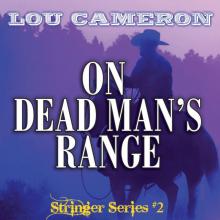 On Dead Man's Range
On Dead Man's Range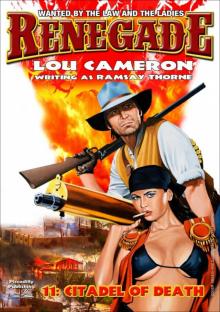 Citadel of Death (A Captain Gringo Western Book 11)
Citadel of Death (A Captain Gringo Western Book 11)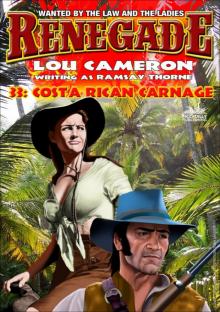 Renegade 33
Renegade 33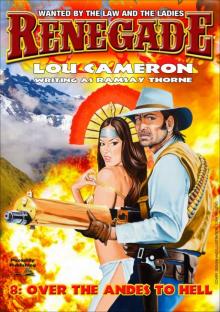 Over the Andes to Hell (A Captain Gringo Western Book 8)
Over the Andes to Hell (A Captain Gringo Western Book 8)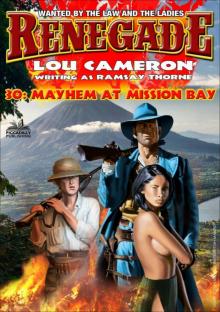 Renegade 30
Renegade 30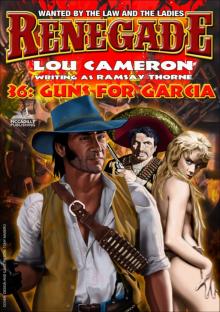 Renegade 36
Renegade 36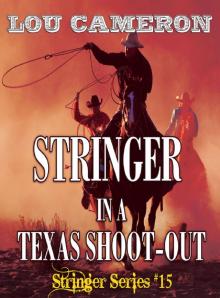 Stringer in a Texas Shoot-Out
Stringer in a Texas Shoot-Out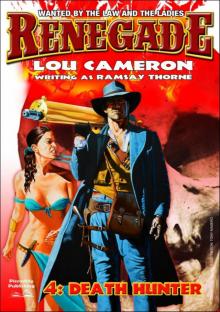 The Death Hunter
The Death Hunter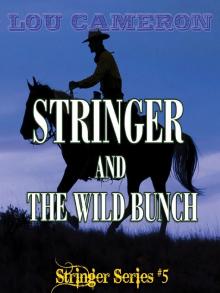 Stringer and the Wild Bunch
Stringer and the Wild Bunch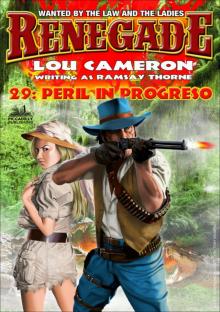 Renegade 29
Renegade 29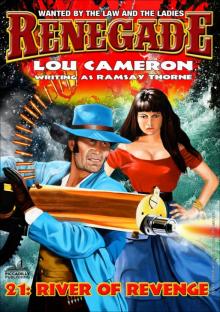 Renegade 21
Renegade 21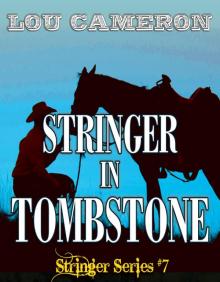 Stringer in Tombstone
Stringer in Tombstone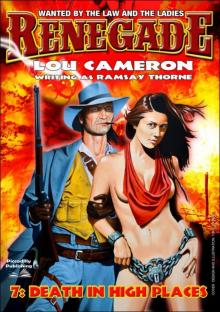 Death in High Places (A Renegade Western Book 7)
Death in High Places (A Renegade Western Book 7)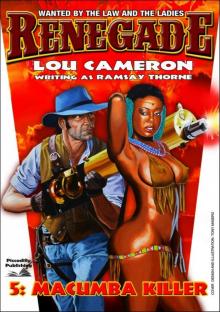 Macumba Killer
Macumba Killer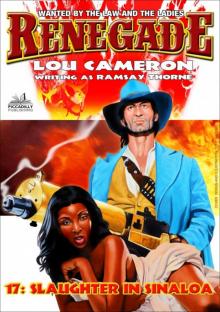 Renegade 17
Renegade 17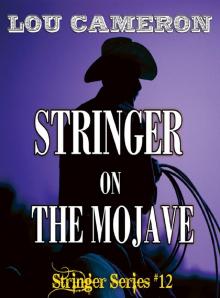 Stringer on the Mojave
Stringer on the Mojave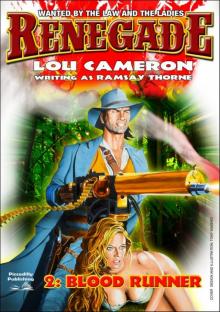 Blood Runner
Blood Runner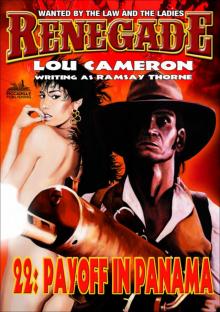 Renegade 22
Renegade 22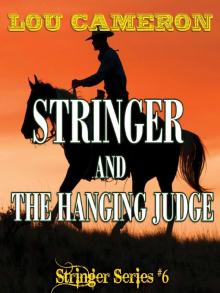 Stringer and the Hanging Judge
Stringer and the Hanging Judge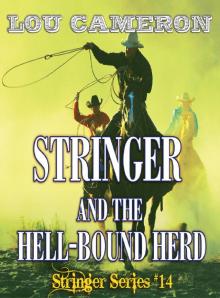 Stringer and the Hell-Bound Herd
Stringer and the Hell-Bound Herd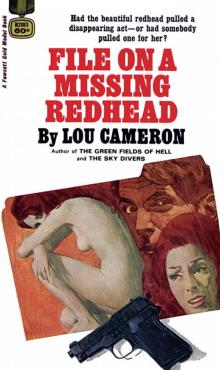 File on a Missing Redhead
File on a Missing Redhead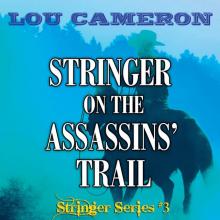 Stringer on the Assassins' Trail
Stringer on the Assassins' Trail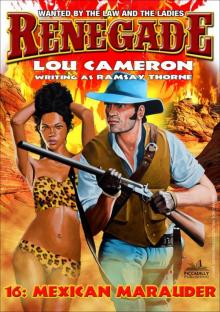 Mexican Marauder (A Captain Gringo Adventure #16)
Mexican Marauder (A Captain Gringo Adventure #16)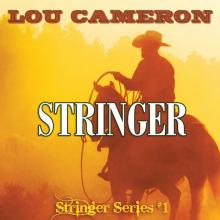 Stringer
Stringer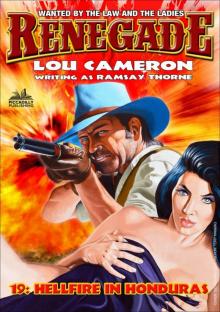 Renegade 19
Renegade 19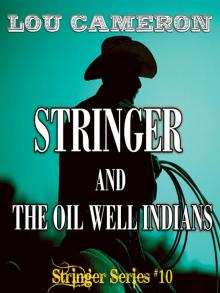 Stringer and the Oil Well Indians
Stringer and the Oil Well Indians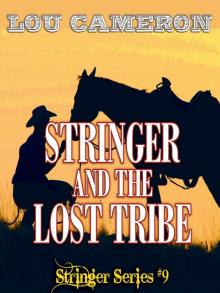 Stringer and the Lost Tribe
Stringer and the Lost Tribe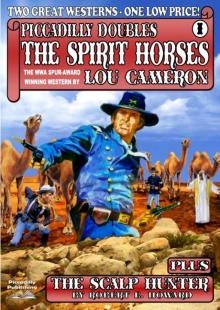 Piccadilly Doubles 1
Piccadilly Doubles 1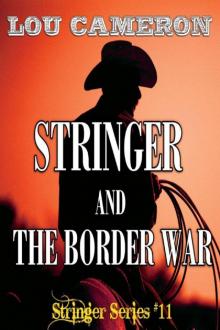 Stringer and the Border War
Stringer and the Border War Renegade
Renegade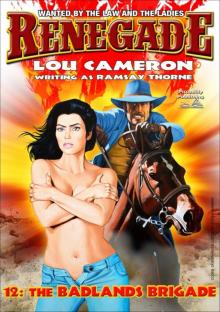 The Badlands Brigade (A Captain Gringo Adventure Book 12)
The Badlands Brigade (A Captain Gringo Adventure Book 12)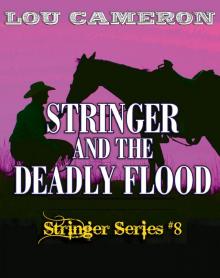 Stringer and the Deadly Flood
Stringer and the Deadly Flood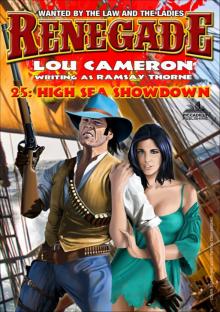 Renegade 25
Renegade 25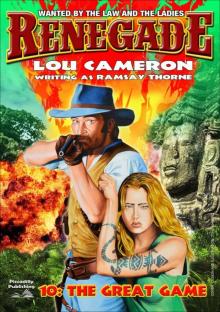 The Great Game (A Captain Gringo Western Book 10)
The Great Game (A Captain Gringo Western Book 10)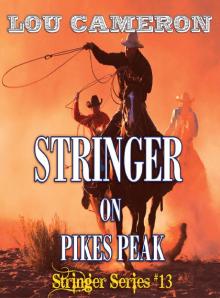 Stringer on Pikes Peak
Stringer on Pikes Peak